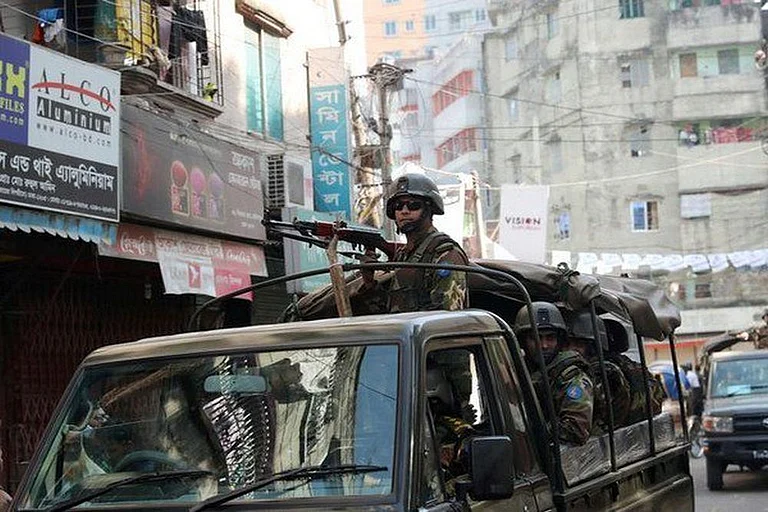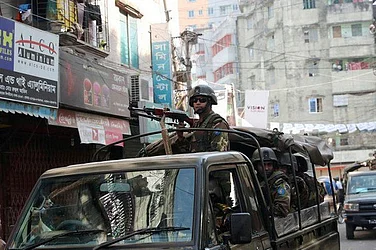The Hamas action on Saturday was aimed at changing the rules of the game and breaking the status quo on the Israel-Palestinian conflict that had resulted in daily deaths for Palestinians. The two-state solution is dead and buried and the international community has decided to bury its head in the sand and forget the issue. That has changed now, but whether for the better or worse remains to be seen.
The retaliation for the Hamas attack has begun, with Israel announcing the siege of Gaza. Reports of tanks and armoured vehicles making their way to the Gaza border have come in. This could be an indication that Israel is preparing for a ground attack possibly after bombing out the Gaza Strip to smithereens. An audacious attempt to rescue the hostages may be in the offing. The United States is standing like a rock behind Israel and while not willing to have boots on the ground, it will provide whatever surveillance assistance is needed to locate the hostages.
Israeli jets have been relentlessly pounding the Gaza Strip with continuous airstrikes to neutralise and destroy Hamas’s military capabilities. Prime Minister Benjamin Netanyahu has warned that the overnight aerial operation “was just the beginning” and more was to come.
There is a possibility of the Hezbollah doing its bit on the Israeli-Lebanon border. Reuters reported that Israeli shelling on Lebanon killed three Hezbollah militants on Monday and Israel said one of its officers was killed during an earlier cross-border raid claimed by Palestinians in Lebanon. Unlike the Hamas, which at best is a rag-tag group of committed fighters, the Hezbollah is a strong military force. A two-front war with hostages still in Hamas custody would be a nightmare scenario for Israel.
The consequences of the Hamas attack are devastating. Civilians on both sides of the divide have been the worst affected. Hamas has rounded up around 150 Israelis —both soldiers and civilians as hostages— to bargain for freeing nearly 5,000 Palestinian prisoners in Israeli jails. The lives of the hostages are at grave risk as Hamas has warned that each airstrike on civilian targets would result in the execution of one hostage.
Egypt and Qatar are trying to convince both Hamas and Israel to work out a deal for a prisoner swap. There are reports that the negotiations are on to release 36 Palestinian women prisoners for an unknown number of Israeli hostages, but have not firmed up. Meanwhile, the fighting continues. The time to stop the fighting is now, but who can do that?
The United Nations Security Council (UNSC) that deals with such issues should have actively tried to defuse the crisis. The UNSC has become at best a place for exchanging barbs, as early as the Iraq invasion. Former US President George Bush and Britain’s PM Tony Blair bypassed the UNSC at the time. The Permanent Five (P5) are no longer capable of making a joint decision. There is no unanimity and Russia, one of the members, is already at war in Ukraine.
UN Secretary-General António Guterres has appealed for peace. While appealing to Hamas not to carry out the threat to kill Israeli hostages in retaliation for the air strikes, he has appealed to Israel to abide by the rules of the game. He said, “While I recognize Israel’s legitimate security concerns, I also remind Israel that military operations must be conducted in strict accordance with international humanitarian law.’’
The one country that can act to stop the fighting at the moment is the United States. With the US presidential elections next November, President Joe Biden is unlikely to risk being a peacemaker in a sticky situation. Rather, it would be easier to lend support to Netanyahu and allow him to take the lead. The United States and Israel are already looking to bring Iran into the equation. Former US President Donald Trump had earlier criticised Biden for allowing Iran access to $6 billion that was frozen under sanctions in return for freeing five American prisoners held in Iranian jails. The United States is looking for evidence of Iran’s involvement in the Hamas attack.
Why a ceasefire will be difficult for Netanyahu
The hardliner Prime Minister Netanyahu, who has built an iron-clad security state, is under attack in his country for the unprecedented attack on Israel. Nearly 900 people have been killed. Israel’s much-vaunted security apparatus was caught napping; the government was distracted by Netanyahu’s attempt to reduce the powers of the Judiciary. This was a contentious issue and led to the resignations of a few top Army officers. The focus was also on the West Bank where new settlements were being encouraged by religious groups that formed part of Netanyahu’s cabinet. Hamas was not regarded as a major threat. The liberal press in Israel is blaming Netanyahu’s distraction with domestic issues for this lapse.
Now Netanyahu will do all that he can to salvage his strongman image and regain public trust. Any show of weakness will come at a heavy political cost. So, a massive retaliation is the only answer to placate public opinion. But in the process, civilians will become collateral damage. In the days and months to come, targeted assassination of the Hamas leadership will follow. There is likely to be an audacious attempt to free the Israeli hostages. The United States, while not placing boots on the ground, has promised to aid Israel’s own sophisticated technology to locate the hostages.
Palestinians in the Gaza Strip have borne the brunt of the air strikes that killed nearly 700 people. The lives of ordinary Palestinians living in the Gaza Strip, often called the world’s largest open-air prison, will now become even more intolerable. The area has already been sealed off, electricity is down, and food and emergency supplies that come in from the Israel crossing stopped.



























